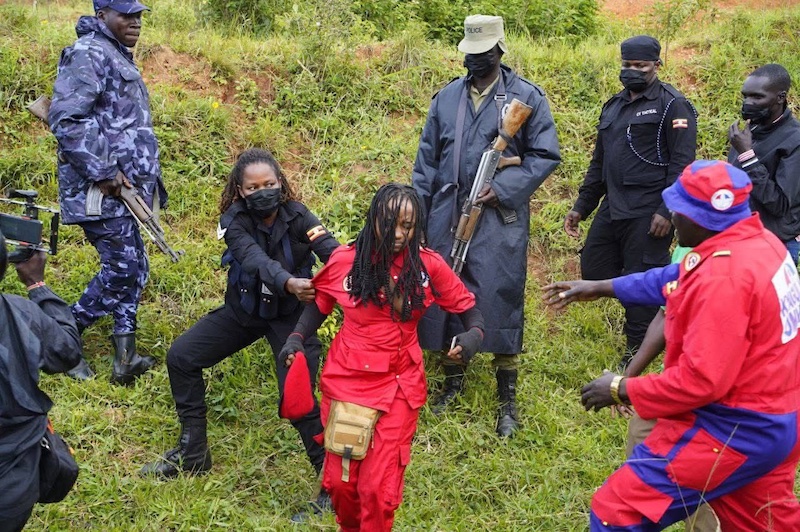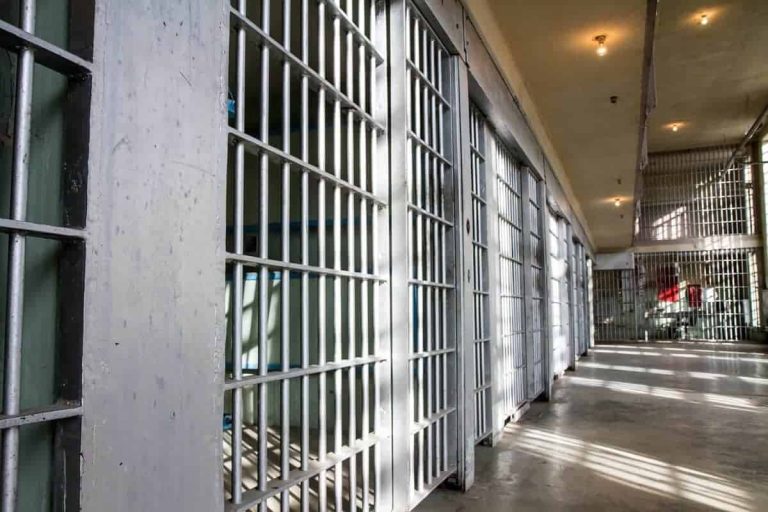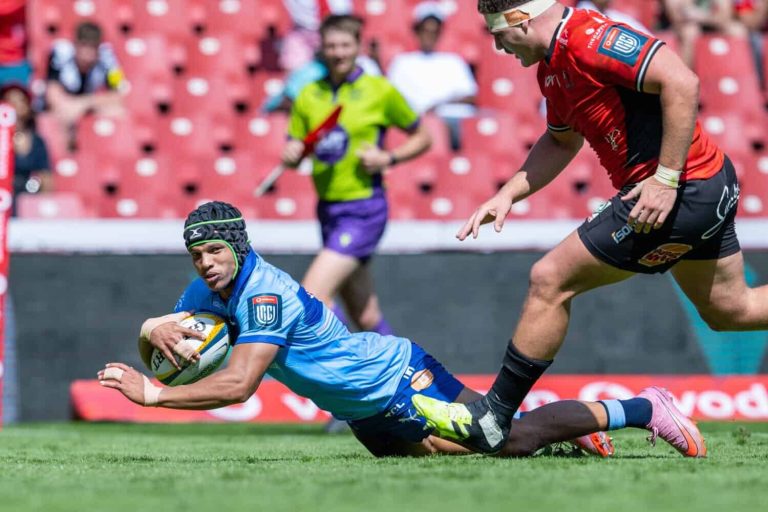
As Uganda heads into a tense election season, President Yoweri Museveni is back on the campaign trail, promising new roads, defending his legacy, and warning voters not to abandon what he calls “steady progress.”
In the hills of Bududa, he pledged once again to tarmac the long-awaited Bubulo–Namisindwa–Bududa circular road, a promise that has lingered for years. But as he spoke of peace, infrastructure and industrial growth, his rivals, from FDC’s Nathan Nandala-Mafabi to NUP’s Robert Kyagulanyi, accused him of neglect, deception, and using state power to silence dissent.
Their competing rallies, filled with cheers, clashes and calls for change, capture a country standing at a political crossroads: one side insisting on continuity, the other demanding renewal.
“We have been pushing for the Bubulo–Namisindwa–Bududa circular road. It was delayed, yes, but now we have the money and we are going to work on it,” Museveni declared, drawing cheers from the crowd.
For residents of this hilly eastern district, that promise to finally tarmac the 25.8-kilometre Bududa– Bubulo road, is decades overdue. The project, which links Manafwa, Bududa and Namisindwa, has long symbolized both hope and frustration.
For years, Bududa’s residents have voted overwhelmingly for Museveni’s National Resistance Movement (NRM), yet many say their loyalty has not been rewarded.
In September, a group of young people staged a protest under the slogan “No road, no vote.”
At the rally, Museveni sought to reassure them that this time would be different. Accompanied by his daughter, Natasha Museveni Karugire, he promised that funds were secured and work would begin soon.
“We do not just talk,” he said, smiling as the crowd cheered. “We show results.” The president pointed to the nearby Bumbobi–Bubulo–Lwakhakha road, which now connects Mbale to Kenya, as proof of progress.
“Peace is our first contribution. Development comes next,” he told supporters. “Electricity and roads are the backbone of transformation.”
STEADY PROGRESS
Museveni has built much of his campaign on that narrative of stability, steady progress and economic transformation. He reminded voters of Uganda’s power crisis in the early 2000s and claimed that investments made under his watch had paved the way for industrial growth in Mbale.

“Because of that electricity, you can now see the industrial park in Mbale,” he said. “It would never have come without reliable power.”
The veteran leader, now 81, also cautioned Ugandans against what he described as misplaced priorities.
“We must first invest in what grows the economy,” he said, urging MPs and voters to prioritize infrastructure and production sectors over higher public salaries. Drawing on his personal memories, Museveni reflected on Uganda’s transformation since independence.
“In 1961, when I was at Ntare School, boys from Bugisu came there because the whole country had only six A-level schools,” he said.
“Today, Bududa alone has more than 10 secondary schools. This is the steady progress of the NRM.”
He again called on Ugandans to embrace wealth creation beyond government jobs, citing the need for more investment in agriculture, manufacturing, and technology. “Government jobs are only 480,000, yet we are 50 million people,” he said.
“Jobs come from factories, farms, hotels, transport and ICT.” The president defended his education programs, saying the government was working to eliminate school fees that block access to free education.
“I introduced UPE in 1997 because I wanted every child to study. But some people did not implement it the way I wanted,” he said.
Museveni also highlighted the presidential skilling hubs, which train young people in trades and crafts.
“Cathy, a graduate from the Bugisu Zonal Industrial Hub, told me she used her start-up capital to open a tailoring workshop in Bududa,” he said proudly. As he wrapped up, Museveni restated the four pillars of his party’s ten-point program: peace, development, wealth and jobs, declaring them the foundation of Uganda’s future.
“Our mission now is to secure that progress,” he said, waving to supporters. THE
OPPOSITION FIRES BACK
But across the political landscape, Museveni’s message of steady progress is being met with open defiance. Nathan Nandala-Mafabi, the Forum for Democratic Change (FDC) presidential candidate and long-time critic of the regime, is campaigning on a very different message, one of betrayal, poverty, and broken promises.
Speaking to supporters in Soroti city, Mafabi accused Museveni of using state resources for personal political gain while neglecting the needs of ordinary Ugandans.
“Instead of using money to help the needy, Museveni and his team are busy printing thousands of campaign posters,” Mafabi said.
“That money could buy medicine for hospitals or seeds for farmers.” He claimed Museveni had kept regions like Teso poor for decades.
“For 40 years, Museveni’s promises have all been lies, empty words meant to keep people dependent,” he told the cheering crowd.
Turning to one of Teso’s most emotional issues, Mafabi condemned the government’s failure to compensate residents for cattle lost during past insurgencies. “Museveni keeps saying every household will receive five cows, but that is impossible,” he said.
“He is just buying time.” Mafabi vowed to honor court rulings that ordered the government to pay compensation. “My government will implement those rulings faithfully,” he said.
“We shall compensate the people of Teso based on scientific market valuations, not political games.” The opposition leader also accused Museveni of “destroying the backbone” of Uganda’s rural economy by allowing the collapse of cooperative unions and farm institutes.
“When Museveni destroyed farm institutes and cooperative societies, he killed the backbone of this region,” he said.
“We are going to rebuild the agricultural sector and restore the Teso Cooperative Union.” FDC party President Patrick Amuriat, who hails from Teso, stood alongside Mafabi, describing him as “a man of integrity who commands national respect.”
He urged the crowd to rally behind FDC as the true alternative. “Museveni is trembling because Mafabi represents real change,” he said.
OPPOSITION UNITES AGAINST INTIMIDATION
Meanwhile, the Alliance for National Transformation (ANT) has joined other opposition parties in condemning what it calls “state-sponsored violence” against National Unity Platform (NUP) candidate Robert Kyagulanyi, better known as Bobi Wine.
In a statement, ANT’s acting national coordinator, Alice Alaso, expressed outrage over the violent dispersal of Kyagulanyi’s rallies in Lira, Kiruhira, and Mbarara.
“The humiliation and undressing of women during arrest is a strong indictment of the NRM government,” Alaso said. “Women in political leadership should rise and condemn this barbaric treatment.”
She urged the Electoral Commission to intervene. “The use of unidentified armed groups to intimidate Ugandans is a recipe for chaos and instability,” she warned.
The statement followed chaotic scenes in Mbarara, where police blocked Kyagulanyi’s convoy and arrested several supporters and journalists. Police said they were acting against “criminal suspects” who attacked officers, but Kyagulanyi accused the authorities of orchestrating the crackdown.
“They are doing everything to stop us from reaching our people, but we shall not stop,” he said defiantly. “We shall keep moving.” At a rally earlier that day, he called for unity across Uganda’s divisions.
“Our party’s name has a ‘U’ in the middle; it stands for unity,” he told supporters. “We will build a new Uganda that unites everyone, across regions and tribes.” Kyagulanyi also promised to create 10 million jobs for youth by recovering funds lost to corruption.
“We will return stolen money to the people,” he said. As the January 2026 elections draw closer, Uganda’s political temperature is rising fast. Museveni leans on legacy and stability; Mafabi and Kyagulanyi promise change and renewal.
But on the dusty roads of Bududa, where villagers still wait for the promised tarmac, the election is not just about speeches or slogans. It’s about whether the promises, old or new, will finally reach the people who have waited longest to see them fulfilled.



